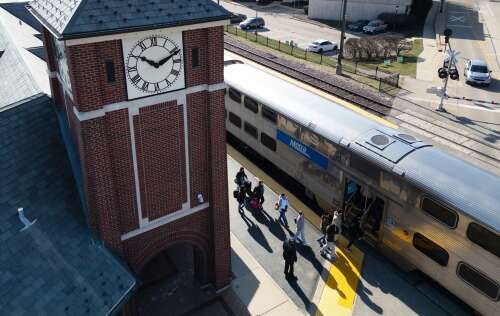Jam-packed Metra cars and CTA platforms. Fewer expresses and more milk-run trains. A one-hour lag between Pace buses.
Those are some of the worst-case scenarios that could happen when federal COVID-19 aid runs out in 2026, leaving a $730 million transit budget hole, a Regional Transportation Authority analysis finds.
Metra riders climb aboard a train at the Palatine station. Metra, Pace and the CTA face a looming financial shortfall that could lead to service cuts.
Paul Valade/pvalade@dailyherald
Assuming Metra, Pace and the CTA fall off the so-called “fiscal cliff,” budgets could be slashed by 20%, leading to service cuts of 30% to 40%, RTA planners hypothesized.
For an Arlington Heights commuter, that could translate into 76 weekday Metra UP Northwest trains shrinking to 45. Or a Naperville rider losing 36 BNSF trains from the current roster of 90.
Chicagoans can look forward to “dramatic overcrowding” at the CTA’s Belmont Station, where the Red, Blue and Purple lines converge, the study predicts.
“The flexibility that people have to rely on transit starts to drastically diminish,” RTA Executive Director Leanne Redden said Thursday.
On Pace, the wait time between buses could stretch from 45 minutes to one hour. CTA riders could see a 15-minute interval until the next bus comes increase to 25 minutes.
RTA staff noted all scenarios are theoretical and the three transit boards would determine actual cuts if necessary.
Less transit, however, also impacts employment, analysts said. In Bridgeview and Waukegan, where Pace brings workers to Metra stations, “the typical resident would see the number of jobs they can reach on transit reduced by as much as 46%,” the report stated.
What else? If frustrated riders resort to driving, 366 million more vehicle miles could be added to local roads — causing gridlock and undoing efforts to build up ridership decimated by COVID-19, the report suggested.
The state Senate’s Transportation Committee has held hearings on the future of transit across the region this summer. Along with the funding crisis, lawmakers are also considering merging all four agencies into one mega-organization to increase efficiency and save money.
Regarding the RTA’s research, “I’d like to see the data to back up those comments and those numbers,” Democratic state Sen. Laura Murphy of Des Plaines said. “As a member of the General Assembly, I want to rely on facts.”
Transit agencies seeking more funds should know, “there has to be a better level of accountability and transparency, and economy of scale,” Murphy added.
After multiple four-hour hearings with another scheduled Thursday in Lake County, senators need time to absorb testimony “before making any decisions, and certainly before opening the checkbook,” she said.
“I don’t think there’s any question if the legislature is unable to come up with a solution to the fiscal cliff, the first option will be service cuts for all,” Republican Sen. Don DeWitte of St. Charles commented.
But “I am encouraged by the information that has been shared at the hearings to date,” he said. “I believe the legislature will come up with a scenario to prevent Draconian cuts to the three service boards.”
Those could include dedicating state revenues derived from proposed video gaming in Chicago to transit, or requiring means testing for the state’s free rides for seniors program, which is offered regardless of income.
“I’m not sure every senior needs to have free mass transit,” DeWitte said, adding that tweaking the policy could generate millions of dollars.
A Pace bus arrives at the Des Plaines Metra station. Metra, Pace and the CTA face a looming shortfall.
Brian Hill/bhill@dailyherald.com
Chicago isn’t alone, Redden said, noting transit agencies across the U.S. face similar emergencies. For example, Philadelphia’s transit system is staring at a $187 million deficit and could vote this fall on fare hikes to avoid drastic service cuts.
The RTA’s analysis is “not a hair-on-fire scenario. These are the things that Philadelphia is going to be doing … if they don’t find any other funding solutions,” she said.
And despite the 2026 deadline, Redden said, “the reality is — with our budget cycle and the state’s budget cycle — we have to have these solutions worked out this spring.”
• Got an opinion on transit funding? Drop an email to mpyke@dailyherald.com.
The post Goodbye trains, hello gridlock — will transit cash crunch spell big-time cuts? appeared first on Patabook News .

